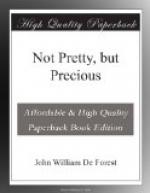“She is rather below the middle height, and her form, though slender, is finely moulded and of perfect proportions. Her hands and feet are faultless, and her walk is extremely graceful, resembling more the gait of a French-woman than that of an English girl. Her complexion is pale and rather sallow, and her countenance is full of expression, which varies constantly when she talks. The lower part of her face is somewhat too thin for perfect beauty, and the chin is inclined to be pointed, and the cheeks are rather hollow, but the upper part is superb. Her brow is low and broad, and she folds back from it the heavy waves of her black hair in the plainest possible style. Her eyes are her chief beauty, and would transfigure any face into loveliness. They are very large, and of a dark, transparent blue, of so lustrous and so perfect an azure that not even in shadow do they look black. Stay—I can give you a better idea of her appearance than by multiplying words. Did you, when you were in Munich, visit the Gallery of Beauties in the Royal Palace?”
“I did.”
“Do you remember the portrait of Lola Montez?”
“Certainly—as though I had seen it yesterday.”
“Marion resembles that portrait very strikingly, particularly in the shape and carriage of her head.”
“I am not mistaken—it is she. Would that I had never lived to see this day!” And Mrs. Rutherford wrung her hands in an agony of helpless, hopeless distress.
“It is she?” repeated Horace, in perplexity. “Whom do you mean, mother? Who was Marion Nugent?”
“She is not Marion Nugent—this impostor who has thrust herself into our midst, bringing scandal and dishonor as her dower.”
“And who, then, is she?”
Mrs. Rutherford turned toward him and fixed on his face her tear-bathed eyes, as though sight were restored to her, and she were trying to read his thoughts in his countenance.
“Why should I tell you?” she said, after a pause: “why reveal to you the shameful secret, and tell of a misfortune which is without a remedy? Clement is married: what words of mine can divorce him? And who will believe the evidence of a blind woman? If I were not blind, I might openly denounce her, but now—” And again she wrung her hands in unspeakable anguish.
Horace knelt beside his mother’s couch and folded her hands in his own.
“I will believe you, mother,” he said, earnestly. “Trust me—tell me all. If this woman whom my brother has married be an impostor, he may yet be freed from the matrimonial chain.”
“Could that be possible?”
“It may be. Let me try, at least. I will devote myself to your service if you will but confide in me.”
“Close the door, and then come near me, Horace—nearer still. I will tell you all.”
Two days later the steamship Pereire sailed from New York for Brest, numbering among her passengers Horace Rutherford.




